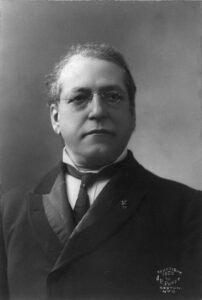
Samuel Gompers (Jan. 27, 1850-Dec. 13, 1924) was born to Solomon Gompertz and his wife Sarah Root in London, England, and at the age of 10 started working as an apprentice cigar maker to help support his family. He went to night school classes, where he learned Hebrew and studied the Talmud. In 1863 the family immigrated to the United States, where Samuel helped his father manufacture cigars. At age 14, Samuel joined the English-speaking Cigar Makers Local Union No. 15, and three years later moved to the employ of David Hirsch & Company, where he met German-speaking cigar workers, learned the German language, and came under the influence of Karl Laurrell, former secretary of the International Workingmen’s Association. In 1875, Gompers was electd as president of Local 144 of the Cigar Makers International Union. In 1886, he was elected as the second vice president of the Cigar Makers’ International Union and as its first vice president in 1896, a position he retained until his death.
In 1881, Gompers helped to found the Federation of Organized Trades and Labor Unions, which reorganized itself in 1886 as the American Federation of Labor, with Gompers as president. In the 1890s, he expanded the AFL to Canada, particularly Ontario. Like most labor leaders, Gompers opposed unrestricted immigration from Europe because it might lower wages of domestic union workers. He was an opponent of Asian immigration to the United States, strongly supporting the discriminatory Chinese Exclusion Act of 1882. The American Federation of Labor eclipsed the Knights of Labor. In 1911, he was prosecuted for publishing a boycott list, but in 1914 the Supreme Court overturned his sentence in Gompers v. Buck’s Stove and Range Company.
During World War I, Gompers was appointed by President Woodrow Wilson to the Council of National Defense and chaired its Labor Advisory Board. He attended the Paris Peace Conference in 1919 as an official advisor on labor issues. As chair of the Commission on International Labor Legislation, Gompers successfully advocated for a workers’ rights charter to be include in the Treaty of Versailles. Following the war, he supported amnesty for political prisoners convicted in the U.S. for violating Wartime Emergency Acts. He fell gravely ill while attending a meeting of the Pan-American Federation of Labor. He expressed a desire to die on American soil and a special train sped him to the United States, where he died in San Antonio, Texas. He is buried at Sleepy Hollow Cemetery in Sleepy Hollow, New York, fairly close to the grave of Andrew Carnegie, the steel magnate turned philanthropist.
Tomorrow, January 28: Arthur Rubinstein
*
SDJW condensation of a Wikipedia article